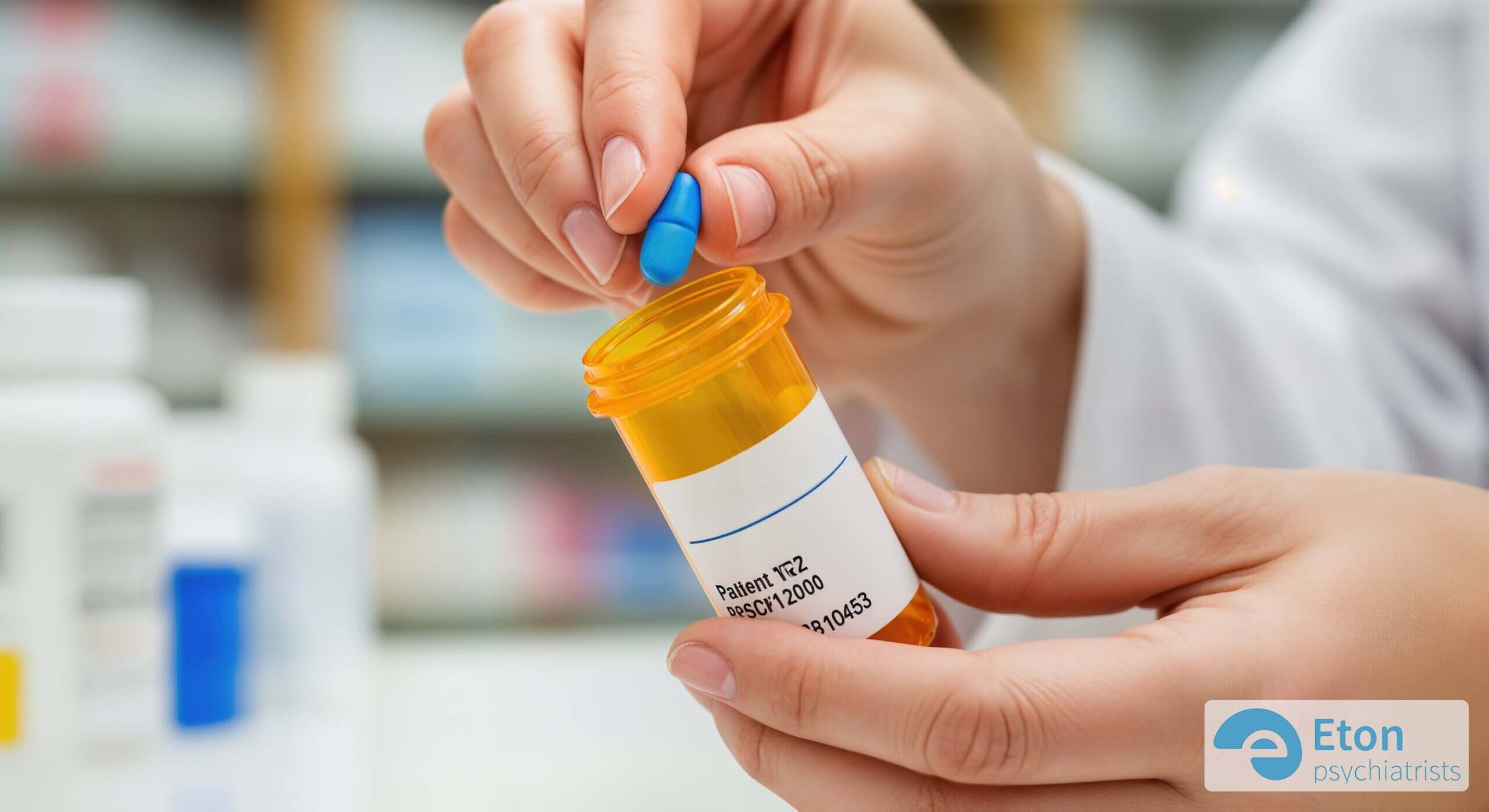
ADHD Medication: Separating Myths from Life-Changing Truths
Listen to the Article
For those on the go or who prefer listening, you can play the full audio version of this deep dive below.

It’s one of the most common questions we hear: “Is ADHD medication safe?” Surrounded by misinformation online and offline, it’s completely understandable to feel hesitant. Many pervasive myths paint a picture of risk and dependency, overshadowing the reality that for most people, professionally managed medication is a safe, effective, and often life-changing tool. Feeling cautious is a normal part of the process, and the first step to clarity is separating fear from fact. This guide is here to provide evidence-based answers from qualified clinicians, helping you make an informed and empowered choice about your health.
Table of Contents
- Why Your Concerns Are Valid
- Debunking Foundational Myths About ADHD and Its Medication
- Addressing the Biggest Fear: Addiction and Side Effects
- A Practical Guide to Your Medication Journey in the UK
- The Truth: Medication as a Life-Changing Tool
- Why Trust Eton Psychiatrists?
- Summary
- Sources
- Frequently Asked Questions
Why Your Concerns Are Valid
If you’re worried about starting ADHD medication, you are not alone. This feeling is so common it has a clinical name: “medication hesitancy.” It stems from a potent mix of social stigma, sensationalised media stories, and a genuine desire to do what’s best for your body and mind. These concerns are not something to be dismissed. They are valid questions that deserve clear, professional answers. In a digital world filled with conflicting advice, it’s easy to feel overwhelmed. Our goal as clinicians isn’t to push a prescription, but to act as your partner, providing the factual information you need to cut through the noise and feel confident in your healthcare journey.
Debunking Foundational Myths About ADHD and Its Medication
To understand the treatment, we first need to be clear about the condition itself. Many myths about medication are rooted in fundamental misunderstandings of what ADHD is and how treatment actually works.

Myth 1: ADHD isn’t a real medical condition, it’s just an excuse.
The Reality: ADHD is a recognised neurodevelopmental disorder, not a character flaw or a lack of willpower. It is acknowledged by major global health bodies, including the NHS and the World Health Organization. Brain imaging studies show measurable differences in the structure and chemical activity of a brain with ADHD, particularly in areas managing executive functions like focus, impulse control, and emotional regulation.
Myth 2: You can’t have ADHD if you’re successful at work or school.
The Reality: This is a harmful stereotype. Many highly intelligent and successful people have ADHD. They often succeed despite their challenges, sometimes by developing complex coping mechanisms or working much harder than their peers. Furthermore, the ability to “hyperfocus”—an intense concentration on a topic of interest—is a common ADHD trait that can mask underlying difficulties with more mundane but essential tasks.
Myth 3: ADHD medication will turn me into a “zombie.”
The Reality: The goal of medication is to sharpen focus and calm impulsivity, not to erase your personality. When patients report feeling “flat” or “zombified,” it’s almost always a sign that the dosage or the specific medication is not the right fit. This is precisely why treatment is overseen by a psychiatrist who works with you through a “titration” process to find the optimal dose that helps you feel like the best version of yourself, not a different person.
Myth 4: Taking stimulant medication is the same as taking illegal street drugs.
The Reality: This is a dangerous and inaccurate comparison. While some ADHD medications are classed as stimulants, they are fundamentally different from street drugs in their chemical formulation, dosage, and delivery method. Medical stimulants are prescribed in controlled, often slow-release doses that gradually increase key neurotransmitters like dopamine. This therapeutic action avoids the sudden, intense rush that causes the euphoric high and addictive potential of illicit substances.
Addressing the Biggest Fear: Addiction and Side Effects
The most potent myths often revolve around personal safety. Let’s tackle the concerns about addiction and side effects head-on with clinical facts.

Myth 5: Taking ADHD medication will make me an addict.
The Reality: When taken as prescribed by a medical professional, the risk of addiction to stimulant medication is very low. As explained above, the controlled, therapeutic dosage doesn’t produce the addictive high that recreational users seek. In fact, research overwhelmingly suggests the opposite is true. Adults with untreated ADHD are at a significantly higher risk of developing substance use disorders as a way to self-medicate their symptoms. Proper treatment can therefore be a protective factor against addiction.
Myth 6: The side effects are too dangerous to risk.
The Reality: Like any effective medication, ADHD treatments can have side effects. The most common are decreased appetite and difficulty sleeping, particularly when starting the medication. However, these are typically mild and often lessen over time. A psychiatrist will monitor you closely and provide strategies to manage them, such as adjusting meal times or the timing of your dose. Serious side effects are rare and are screened for before treatment even begins, ensuring medication remains a safe option for patients.
A Practical Guide to Your Medication Journey in the UK
Understanding the myths is one thing; navigating the healthcare system to get help is another. The UK landscape presents unique challenges that are important to acknowledge.

- NHS Wait Times vs. Private Assessment: The reality for many is that NHS waiting lists for an adult ADHD assessment can be several years long. This has led many to explore private clinics, which can offer much faster assessment and treatment pathways.
- What is a “Shared Care Agreement”? This is a crucial part of the process in the UK. After you have been diagnosed and your medication is stabilised by a private psychiatrist, a shared care agreement can be set up with your NHS GP. This allows your GP to take over the repeat prescribing, making your ongoing treatment more accessible and affordable.
- The Titration Process: Finding the right treatment is a careful, collaborative process. “Titration” involves starting on a low dose of medication and gradually increasing it under your psychiatrist’s supervision. This allows you to find the most effective dose with the fewest side effects, ensuring the treatment is tailored specifically to you.
The Truth: Medication as a Life-Changing Tool
Once myths are cleared away, the potential benefits become clear. For the approximately 80% of adults who respond well to it, medication is not a cure but a powerful tool. It provides the “training wheels” needed to make other positive changes. By quietening the noise, it allows you to build routines, engage more effectively in therapy like CBT, and develop the coping strategies for long-term success. The goal is to improve not just your focus at work, but your relationships, your emotional stability, and your overall quality of life.
Why Trust Eton Psychiatrists?
At Eton Psychiatrists, our practice is built on a foundation of clinical excellence and profound empathy. We are a dedicated clinic specialising in Autism and ADHD, meaning our entire focus is on understanding and treating these specific neurodevelopmental conditions. Our team of qualified clinicians is committed to evidence-based, personalised care, ensuring you are seen, heard, and supported at every stage of your journey. We don’t just treat a condition; we empower the individual.
Summary
- Your Concerns Are Valid: Feeling worried about ADHD medication is a normal and common experience called “medication hesitancy.” It’s important to address these concerns with factual information.
- ADHD is Real, Medication is Different: ADHD is a real neurodevelopmental disorder. Prescription medication is fundamentally different from street drugs, and does not erase your personality.
- Risk of Addiction is Low: When taken as prescribed, the risk of addiction is very low. Treating ADHD properly can actually reduce the risk of substance abuse that comes from self-medicating.
- UK System Navigation: The UK journey often involves navigating long NHS wait times and understanding the “Shared Care Agreement” process for making private treatment affordable long-term.
- A Tool, Not a Cure: Medication is a powerful tool that helps manage symptoms for about 80% of adults, allowing them to build better routines and coping strategies for an improved quality of life.
Sources
Frequently Asked Questions
Will ADHD medication change my personality or turn me into a ‘zombie’?
The goal of medication is to enhance focus, not numb your personality. If you feel “flat,” it’s a sign the dose or medication isn’t right. A psychiatrist will work with you to find the correct balance that helps you feel like your best self.
Is ADHD medication addictive?
The risk of addiction is very low when medication is taken as prescribed by a doctor. The controlled, therapeutic doses do not produce the euphoric high that leads to addiction.
Is taking stimulant medication the same as taking street drugs?
No. Although they are in the same class of drug, they are very different. Medical stimulants use slow-release formulas and controlled doses that are medically supervised, unlike the dangerous and unpredictable nature of illicit drugs.
What is a “Shared Care Agreement” in the UK?
It is an agreement between your private psychiatrist and your NHS GP. Once your condition is stable on a medication prescribed privately, the agreement allows your GP to take over issuing repeat prescriptions, making ongoing treatment more accessible and affordable.



